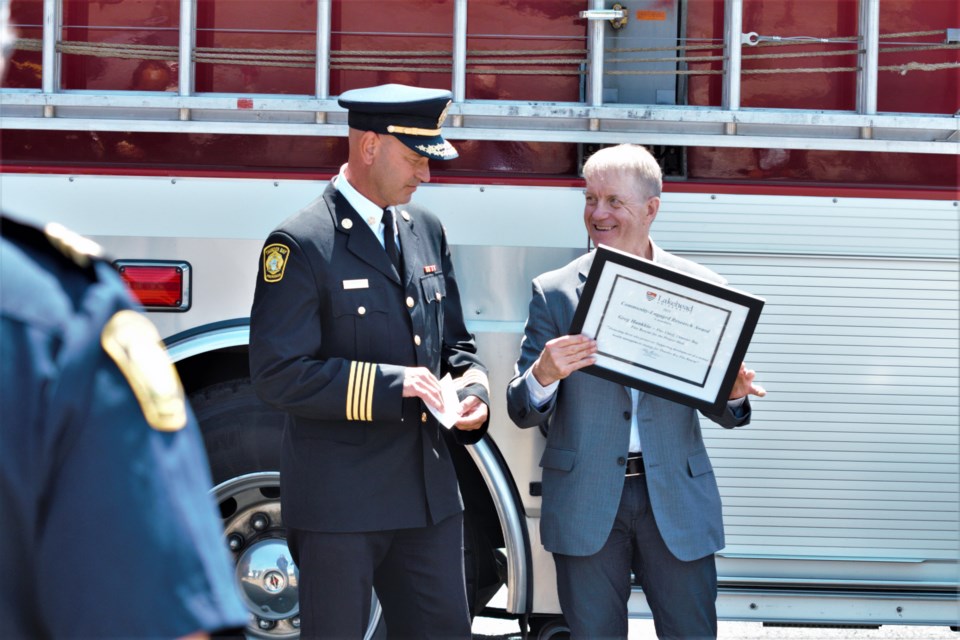THUNDER BAY – A partnership between Lakehead University and Thunder Bay’s fire service addressing firefighters’ mental health has been celebrated with a research and innovation award.
The years-long partnership led by Kathryn Sinden, an associate professor of kinesiology at Lakehead, focuses on developing strategies to address mental health concerns linked to traumatic experiences on the job.
Representatives from the university, Thunder Bay Fire Rescue, and the Thunder Bay Professional Firefighters Association (TBPFFA) belatedly gathered Thursday at the North Central Fire Station on Water Street to receive the Community-Engaged Research Award from Lakehead, which was announced virtually in March due to COVID-19.
The research project “Protecting those who protect us: Supporting development of a mental health management strategy for Thunder Bay Fire Rescue” assessed peer support provided through a critical incident response team (CIRT) at TBFR.
It also considered the impact of the program on the firefighters delivering peer support, who Sinden said took on an additional burden.
First class firefighter Regan Bolduc played a key role on the research team, liaising with the TBFR’s health and safety committees and using results to inform changes, like the development of a new psychological health and safety committee.
“As firefighters we’re exposed to a lot of traumatic incidents in people’s lives,” he said. “So how do we deal with those types of events that occur on the job? The work with Lakehead is really looking at finding strategies to help firefighters maintain their mental health and wellness through the rigours of this job.”
Bolduc and Dennis Brescacin, TBPFFA president and division chief of administration with TBFR, said the research drove home the need for mental health supports. They believe the results could be useful to other emergency service workers, as well.
“The data we get from this will definitely help us have some scientific evidence to prove that professional help is needed,” said Brescacin. “We need psychiatrists, psychologists. We had a critical incident response team doing peer support. That’s the best we had at the time, but we need to take it up to another level.”
Previous research by Sinden indicated nearly all firefighters in Thunder Bay experience at least one critical event over a two-month period.
Of those critical events, 79 per cent involved at least one death, and 54 per cent involved children, rates seemingly higher than the norm in Canada.
“Firefighters in Thunder Bay certainly have high exposure to what we call critical incidents – things they see in the field that have been linked to higher risk for things like… post-traumatic stress disorder and injury,” Sinden said Thursday.
The research team continues to work on projects including a review of suggested interventions, she said.
They also aim to publish in peer-reviewed journals, and have presented findings at academic and firefighting conferences.
The results are built on a years-long partnership that helped get results, with Sinden estimating around three quarters of local firefighters participated.
That rate also reflects a growing openness to discussing the mental health, she believes.
“The willingness to come forward and say, let’s talk about some of the challenges… I think that’s new. That’s one of the great things about this work – we’ve opened that dialogue.”
It’s a positive step the association was happy to promote, said Brescacin.
“I started with TBFR 30 years ago, and back then it was just – you went to calls, you saw this bad stuff, but you never talked about it, you never had any help,” he said. “It just sat in your mind and a lot of this stuff, you still remember it like it was yesterday.”
Bolduc said real improvements had already come from the research, something Andrew P. Dean, Lakehead’s vice-president of research and innovation, highlighted while presenting the award.
“This award celebrates applied research with direct outcomes for community needs, an area of research that’s core to [our] research and innovation,” he said. “This project is an excellent example of such research.”
The work was made possible in part thanks to two grants from the Canadian Institutes of Health Research.
